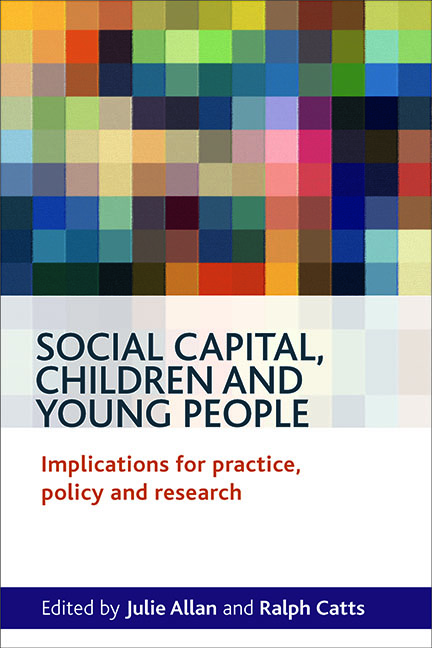four - Social capital in the lives of young carers
Published online by Cambridge University Press: 01 September 2022
Summary
Introduction
Approximately three million children live in families affected by a chronic mental or physical health problem or disability in the UK. However, fewer than six per cent are officially recognised as young carers (Dearden and Becker, 2005). Young carers are often isolated, their caring roles leaving few opportunities for social and leisure activities, employment or friendship networks. The caring role can bring social isolation and mental health problems for young people (Dearden and Becker, 2005). Some rarely leave their homes except to go to school, and often young carers’ school work is disrupted by their caring duties, leaving them disadvantaged in terms of educational outcomes. Some young carers are also vulnerable to being admitted to care if their family member is hospitalised or dies.
Becker (2000, p. 378) defines young carers as:
Children and young persons under 18 who provide or intend to provide care, assistance or support to another family member. They carry out, often on a regular basis, significant or substantial caring tasks and assume a level of responsibility which would usually be associated with an adult.
With many families being in receipt of benefits and unable to work because of illness or disability, and with the majority of young carers living in single parent families, they are more likely to be living in poverty, thus exacerbating their access to social and other forms of capital. Low confidence and low self-esteem are also common among this group, making the formation of relationships outside the family even more difficult. Young carers are by definition living with difficult home circumstances. Their parents or siblings may be suffering from long-term ill health, disabilities, drug or alcohol dependency or mental health problems.
Community care policies often assume that care for ill or disabled relatives can be provided by other family members irrespective of age, or by friends and neighbours; in other words, relying on social capital within the local community. While there is a wider debate about the role of the state in providing such a service, the issue for young carers in particular is that they have limited access to social capital by dint of their age and status. They may take on an unprecedented amount of responsibility in childhood for the welfare of vulnerable adults within the family, which in itself may give them a degree of bonded social capital within the family.
- Type
- Chapter
- Information
- Social Capital, Children and Young PeopleImplications for Practice, Policy and Research, pp. 53 - 76Publisher: Bristol University PressPrint publication year: 2012

